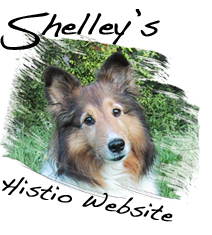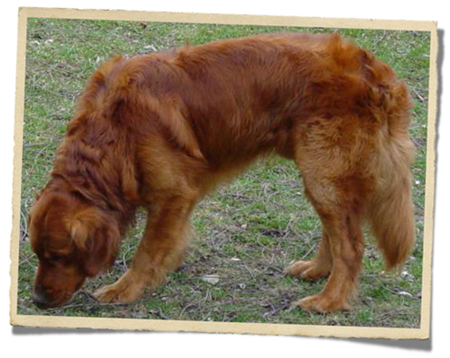
HOME
 YOUR HISTIO STORY
YOUR HISTIO STORY
I am looking for similarities
in all individual cases of
Histiocytic diseases.
I wonder if we all tell our
stories we might come up
with some commonality
between the specific
situations in which all of
our pets got this disease.
So please email me the
details and I'll put your
pets story on Shelley's
Histio Website
 UW HISTIO VERHAAL
UW HISTIO VERHAAL
Ik ben op zoek naar
overeenkomsten in alle
individuele gevallen van
Histiocytose.
Ik hoop dat wanneer wij
onze Histio verhalen
vertellen, wij overeen-
komsten ontdekken over
de manier waarop onze
huisdieren deze ziekte
hebben opgelopen.
Stuur mij de details en
ik zal het verhaal van uw
huisdier op de Histio
website van Shelley zetten.
 WARNING !
WARNING !
These stories are all
different. Individual
symptoms, situations
and circumstances
may vary and response to
therapy is not always the
same.
- Disclaimer -
 WAARSCHUWING !
WAARSCHUWING !
Deze verhalen zijn allemaal
verschillend. Individuele
symptomen, situaties en
omstandigheden kunnen
verschillen en de reactie
op therapie is niet altijd
hetzelfde.
- Disclaimer -
HISTIOCYTOSIS IN
OTHER LANGUAGES
German - Hund
Maligner Histiozytose
French - Chien
l'Histiocytose Maligne
Italian - Canis
Maligni Histiocytosis
Spanish - Perros
Histiocitosis Maligna
Dutch - Hond
Maligne Histiocytose
HOME
Rocket
Malignant Histiocytosis
Rocket's Red Glare VII
Golden Retriever
Male
July 5, 2000 - December 17, 2007


Story told by V. Nahrwold
Our seven year-old Golden Retriever, Rocket was diagnosed with malignant histiocytosis on Friday, August 31. He had been lethargic for a few months following surgery (in April) to remove a benign cyst on his rear leg. He was also nursing a minor injury to his front leg. He had lost nine pounds in four months. When his lethargy reached the point that we grew seriously concerned we took him back to the vet. She felt his abdomen and didn't like what she felt. She immediately took x-rays which revealed an enlarged spleen and liver. She suggested an ultrasound. We took him to the vet with the ultrasound equipment and had the procedure done the next day. He confirmed the spleen was significantly enlarged and requested permission to extract cells for cytology. The results came back relatively inconclusive and in no way indicated cancer. However the veterinarians disagreed with the results of the report and wanted to remove his spleen anyway.
We did not immediately recognize the severity of the situation and wanted to wait on the splenectomy until later the following week so I could meet my professional commitments. I travel extensively for work and was scheduled to be in Columbus, Ohio that next week. Therefore I wanted to postpone the surgery until Wednesday of the following week. Over the weekend he became so lethargic we feared we might lose him. In fact on Sunday night about 11 pm we took him to the emergency clinic. His HCT percentage was down to 21 and he was feeling poorly. That vet suggested he have a blood transfusion the next morning before surgery. She did x-rays and found a suspicious spot on his lung. She was convinced he had hemangiosarcoma. Her recommendation was to not allow him to wake-up from surgery if the spleen was found to contain tumors. We decided to take him home and rush him to our vet first thing the next morning for emergency surgery. Her attitude toward the value of his life was disturbing to us. Somehow he made it through the night and we did just that. Our vet was out that day, however her partner and the vet originally scheduled to perform the surgery was there. We brought him up to speed quickly and he agreed to keep Rocket and perform the surgery. By late morning Rocket was in recovery. The spleen was in fact filled with tumors and was roughly three times its normal size. There was also evidence of metastasis to the liver and possibly his right kidney. The vet removed a sample from the liver for biopsy along with the spleen. We received the dreaded, and unexpected diagnosis on Friday. Histiocytic sarcoma is one of the deadliest of all cancers and not very responsive to chemotherapy. The prognosis is guarded and his life expectancy was 30 days past surgery.
However we were referred to the Purdue University Oncology Department at their Small Animal Hospital. We took Rocket down on Tuesday, September 4. They outlined various treatment options and did baseline imaging. Rocket received his first carboplatin treatment that day. The first few days were horrible. Of course he was so lethargic and weak, not to mention malnourished from hardly eating. He was wobbly and looked emaciated. We thought for sure we were going to lose him. The only food he would initially eat was Fancy Feast canned cat food. We tried everything to get him eating. He had always eaten dry dog food. But when he became sick he no longer wanted it. He had occasionally been given a can of dog food as a treat. So we figured he would be enthusiastic about eating canned dog food. Not exactly. We bought about every variety of high quality canned dog food on the market trying to get him to eat. We even went so far as to buy a couple of lesser quality varieties of canned dog food. We were desperate. We were boiling chicken breast and rice. Still he was barely eating. He had gone from 93 pounds to 77. He is a large Golden and his ideal weight is around 85 pounds. He was barely surviving on around 20 ounces of food per day. Finally after about five days he started eating a little bit more each day.
Since then he has made a miraculous recovery. He is about 89 pounds and eating like a horse. He has received his third carboplatin treatment and just had comparative imaging done on Monday, October 15. The tumors that were present on September 4 in his lung, lymph node, and kidney are missing. His liver is still enlarged but is smaller than it was. His liver enzymes are improved. He is in partial remission. Unfortunately his bone marrow is under attack by the chemo and is in danger. If it gets too low they will have to switch drugs. We hate to see that happen since he has had little negative reaction to the carboplatin and has seen such favorable results. The other mystery is a new mass in a different lymph node. It was biopsied and confirmed to be histiocytic sarcoma. The vet at Purdue is going to contact the original pathologist to get a sample of the spleen to do a strain comparison. We should get the results in a week or so. Depending on the results they may end up switching the carboplatin to something else or adding another drug. It doesn't make sense that the original tumors would be shrinking yet a new one would develop. The jury is still out on that one. In the meantime, Rocket is doing so well. You never know what the right thing to do is. But we have definitely made the right choice here. He is feeling better than he has in months. He is energetic, playful and loving life. We are committed to ensuring he has the highest quality of life possible for his remaining days. To that end, he is now eating primarily canned dog food. He eats 60 ounces of Pedigree each day and loves it. He finishes his plate and brings it to us for more. Unfortunately we have to monitor his weight to ensure he doesn't gain too much too quickly. It is also not a good idea for him to become overweight so we have to say no. But he sure is cute trying.
Update
On November 5, 2007 his white blood cell counts were too low for chemotherapy. He was sent home with CCNU (Lomustine), to be administered 5 days later if his blood count on the 9th was acceptable. But he became lame after taking CCNU. Switched to Doxorubicin (Adriamycin) on December 3, 2007. That was his last chemo treatment. He gradually lost the use of his hind legs. We could not, in good conscience, continue treatment and helped him to the Rainbow Bridge on December 17, 2007.

